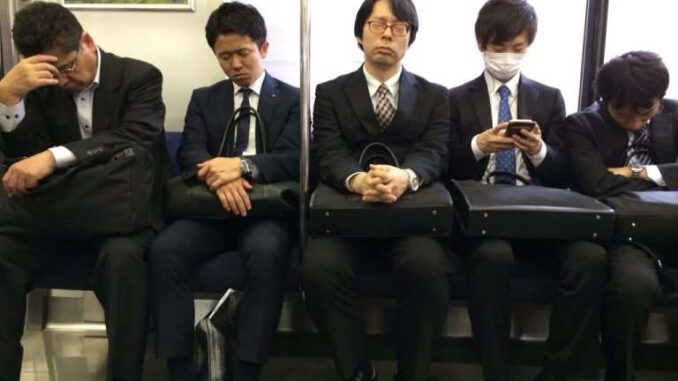
Views: 230
– There is a prevailing stereotype about the men who work in Japan.
Courtesy by Lucy Kikuchi: They are often presented as conservative, risk-averse salaryman who sacrifice their own happiness for the good of the company. This is a contrast with the stereotype of the maverick westerner, who voices his opinion and follows his dreams.
These cliches appeared in a news story by Bloomberg, when it covered the major deal struck between Panasonic and Tesla earlier this year. Panasonic has begun manufacturing batteries for Tesla Model 3. The piece began, “They’re the oddest of couples: Elon Musk – the free-wheeling co-founder of Tesla Inc – and Kazuhiro Tsuga, the buttoned-up salaryman who runs Japan’s Panasonic Corp.”
Bloomberg suggested the two businessmen are borne from different psychologies. In Japan, ‘success’ is synonymous with ‘security’. Entrepreneurship on the other hand is risky; risk is the polar opposite of security.
The birth of the salaryman
After Japan’s surrender at the end of World War II, companies like Panasonic helped propel Japan into the modern era. To gain employment with a company like that was to enjoy a lifetime of job security. Toyota, Sony, Panasonic – these were the companies to aim for. Mr Tsuga joined Panasonic in April 1979 (at the time, Matsushita Electric Industrial Co. Ltd.) after graduating from Osaka University. He is the epitome of Japan’s traditional notion of success.
Then there is Tesla, founded by Elon Musk.
Musk is one of the ‘PayPal mafia’ and was a young millionaire thanks to his startup Zip2. From linking online searchers to businesses then disrupting banking in his early twenties, he now plans to save humanity by sending us to Mars courtesy of SpaceX. Some of the risks he has taken may prove to be unsuccessful, but he succeeded in Silicon Valley when many others floundered as the dot-com bubble burst.
Old and new
One of the things I love best about Japan is how traditional ways exist parallel to high-tech modern life. I’m not sure anywhere else in the world manages to pull this combination off so effortlessly. Many westerners are fascinated by the Geisha who totter through the streets of Kyoto, then they flock to Tokyo as the mecca of everything high-tech. Yet despite the country’s global and long-standing reputation for innovation and high-quality products, it seems that’s not enough to keep Japan globally competitive in the future.
The country can no longer expect the large corporations to fuel innovation, productivity and growth. But if they can’t do this, it means the security of lifetime employment becomes less of a guarantee.
Startup scene
Although Japan’s startup scene is a long way behind that of the US, economic, stagnation is forcing a change.
According to the Nikkei Asian Review, Japan’s Prime Minister Shinzo Abe visited Stanford University in April 2015, saying he wanted to “soak up all that Silicon Valley has to offer and take the lessons to Japanese.” He also reminded those present that Japan’s largest and most prestigious corporations set the global agenda back in the 1980’s and said that Japan can do this again.

As Mr Abe delivers tax incentives for businesses to invest in venture capital, and finance becoming more readily available to startups. But progress towards a more entrepreneurial culture requires a shift in the psychology of a nation.
More and more successful Japanese entrepreneurs are emerging and they become role models to the younger generation. Some young people believe that they can follow a new career path. Success to them is no longer synonymous with security. Perhaps it means being the fastest to deliver the smartest solution?
There’s never been a better time to take a risk. If Tsuga San can do it with Tesla, so can Japan’s next generation.
Lucy Kikuchi lived in Tokyo for six years working as a translator both on the agency-side and in-house for a Japanese manufacturer. She now lives with her family in the UK and is married to a self-employed Japanese businessman – not a salaryman!
Original article published at Duncan Bartlett Blog by Lucy Kikuchi
Leave a Reply